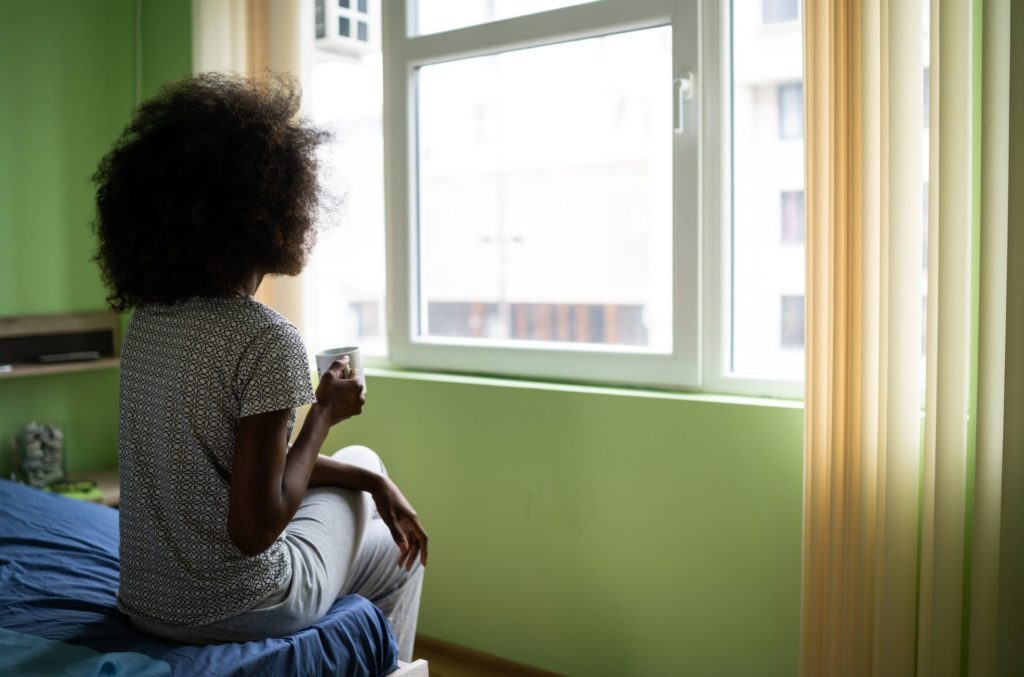If you experience stress and anxiety, you might turn to alcohol as a way to unwind and relax. And frankly, that strategy makes a lot of sense. Since alcohol is a sedative and depressant, it can seem at first like a couple of drinks actually does help calm your nerves.
But drinking to reduce anxious feelings may end up worsening mental health issues. In fact, drinking can actually lead to higher anxiety levels, both short- and long-term, creating a cycle of dependency that continues to reinforce anxiety and alcohol use over time.
If you experience stress and anxiety, you might turn to alcohol as a way to unwind and relax. And frankly, that strategy makes a lot of sense. Since alcohol is a sedative and depressant, it can seem at first like a couple of drinks actually does help calm your nerves.
But drinking to reduce anxious feelings may end up worsening mental health issues. In fact, drinking can actually lead to higher anxiety levels, both short- and long-term, creating a cycle of dependency that continues to reinforce anxiety and alcohol use over time.
What happens when you drink?
So you’re unwinding at a bar with friends, and you’ve just finished your first drink. What happens to your body after you’ve downed it?
Alcohol is absorbed through the lining of your stomach, so it enters your bloodstream very quickly. As your blood circulates, the alcohol makes its way to your brain and the other parts of your body.
The alcohol in your bloodstream takes just 5 minutes to reach your brain. As your blood alcohol content (BAC) rises, you start to feel the effects of intoxication, usually within 10 minutes of finishing your first drink.
As your BAC increases, you might begin to feel at ease or uninhibited. Given this effect, it’s understandable that so many people use alcohol to help them unwind or relax. For some, the effects of drinking can even be similar to benzodiazepines, a class of sedative medication used to treat acute anxiety and panic disorders.
Many people drink to manage anxiety because alcohol can deliver this immediate sense of ease and comfort. Initially, it really does seem to work.
But does alcohol help anxiety? Despite the window of relief you may experience after your first couple of drinks, alcohol doesn’t promote anxiety reduction. What’s more, the impact alcohol has on your brain can actually work against you to increase anxiety.
The effects of alcohol on your brain
So what happens first when the alcohol from that drink reaches your brain? Alcohol activates your brain’s built-in reward system. This is the part of the human brain that evaluates how good something feels and releases certain chemicals that motivate you to get more of whatever it is that feels so good.
When that drink hits your brain, your pituitary gland releases a bunch of endorphins. These chemicals reduce your perception of pain and trigger an experience in the body that’s similar to opiates.
But that’s not all. During the first stage of drinking, your brain also releases the neurotransmitter dopamine. Most significantly, alcohol binds with your brain’s gamma-aminobutyric acid (GABA) receptors and increases their activity. All of these neurochemical changes lead to that relaxed, euphoric feeling— alcohol + anxiety = ease.
In short, those first couple of drinks activate your brain’s pleasure centers, giving you an immediate sense of relief. Because drinking triggers these neurobiological feel-good responses, many people find themselves continuing to turn to a drink for that reward long after drinking has ceased to be a rewarding experience.
Here’s where the human mind gets even more fascinating. It’s not the actual “reward” you get from alcohol that makes a drink sound so good when you’re feeling stressed. It’s the expectation of that reward. This expectation of reward is part of the neurocircuitry that makes addiction a disease.
And yes, it might work at first to give you a break from stress or anxiety, at least for a little while, but the reward doesn’t last. Since what goes up must come down, the eventual drop in your BAC can have a profound impact on your neurochemistry and mental health.
How is alcohol a depressant?
Alcohol gets in the way of normal communication between your nerve pathways. In fact, alcohol blocks the chemical signals in your brain so that excitatory activity in your nerves is suppressed when you drink.
The depressive symptoms can cause a dangerous feedback loop. Alcohol depresses the central nervous system (CNS), which is why alcohol is referred to as a depressant.
This system, which is made up of the brain and the spinal cord, is responsible for a complex set of functions—taking in and processing information through the senses, as well as controlling motor function, reason, and emotion.
When you drink, your otherwise very efficient CNS gets slowed down. You’ve probably witnessed this in people who have been drinking. Here are some classic examples of the way alcohol impairs the CNS:
- Slurred speech
- Blurred vision
- Slowed response time
- Loss of motor control
- Changes in hearing
- Lack of inhibition
- Poor judgment
How much alcohol is too much?
Moderate alcohol use can be part of an overall healthy lifestyle, but sometimes consumption escalates to the point of harm. So, how do you know if you’re drinking “too much?”
The medical perspective
The National Institute on Alcohol Abuse and Alcoholism (NIAAA) offers guidelines for alcohol consumption based on your gender and the number of drinks you have on a given day. Here’s how they define what counts as a standard drink.
According to the NIAAA, there are 2 main patterns when it comes to “excessive” alcohol use. If these descriptions match the way you drink, it’s more likely that your drinking will lead to harmful consequences, such as an alcohol use disorder (AUD).
Here’s how the NIAAA classifies heavy alcohol use:
- For men, taking 4 or more drinks a day.
- For women, taking 3 or more drinks a day.
They define binge drinking as drinking in such a way that your BAC reaches a level of 0.08% or higher in the course of 2 hours.
- For men, 4 or more drinks in 2 hours.
- For women, 5 or more drinks in 2 hours.
Over time, excessive drinking can cause severe physical and emotional consequences, including but not limited to alcohol abuse. An estimated 15 million Americans have an AUD.
For those with a long-term AUD, excessive drinking can cause serious and even irreversible harm to the body and mind, as well as relationships and livelihood. Some people with chronic AUD develop a neurological disorder called Wernicke-Korsakoff syndrome, also sometimes referred to as a “wet brain,” which leads to brain damage, chronic psychosis, and loss of motor function.
The personal perspective
But there are other, more personal indicators that your drinking may be an issue. Here are some of the most common experiences of people who drink to the point of causing harm.
You drink when you don’t want to.
There might be a hundred good reasons not to drink. Maybe you intend not to drink or even promise yourself you won’t, but you end up drinking regardless of your desire or intention.
You continue to drink despite the consequences.
Alcohol may have a negative impact on your relationships and your work, school, or home life—yet you keep on drinking.
You can’t stop once you start.
Once you put alcohol in your system, you lose control of how much you drink. You can’t seem just to have that one drink.
You’re preoccupied with drinking when sober.
Your thought patterns when physically sober might be disproportionately focused on drinking. This preoccupation may lead you back to a drink.
You keep drinking to avoid physical withdrawal.
Maybe you start to tremble or shake when sobering up, so you continue to drink.
You need a drink to function.
Maybe you need a drink to get to work in the morning or one to eat dinner at the end of the day. Either way, you require a drink to perform basic daily tasks.
You drink often.
One indicator of alcohol misuse is how often you drink. Not everyone who has a daily drink has issues with alcohol. But drinking every day is one indicator of a possible AUD.
You need more and more alcohol.
As your tolerance increases, you need to drink more and more to get the desired effects.
You binge drink.
Again, binge drinking is defined as drinking that brings your BAC to 0.08% or more within 2 hours. Research shows that you’re more likely to experience a blackout if your BAC increases rapidly as it does for binge drinkers.
Your friends and loved ones are concerned.
Finally, the people in your life who care about you may worry about how much you drink or what happens when you do.
If this way of using alcohol sounds familiar, you’re not alone. More importantly, there are many treatment options to explore for people who want help with their drinking.
How anxiety works in the brain
Anxiety is a normal part of life, and it’s actually an intelligent emotion. Our brains are hardwired to respond to danger as a survival trait meant to protect us from harm.
The part of the brain that springs into action to protect us from danger is called the amygdala. When it senses a threat, the amygdala releases hormones that increase blood pressure and heart rate, preparing you physically to deal with an imminent threat.
The amygdala is part of the so-called “reptilian” brain that helped early humans survive their world. But in today’s world, a brain primed for anxiety can cause more harm than good. According to a hypothesis called the “evolutionary lag,” the brain you have today is perfectly suited to the world as it was 50,000 years ago.
So what does this mean for you as someone who has anxiety in the modern world? Your brain may react to perceived threats, like a slight at the grocery store, the same way our ancestors’ brains reacted to, say, a saber-toothed tiger.
Your amygdala responds to perceived danger by triggering your body’s emergency stress response. An oversensitive amygdala might react to everyday stressors by flooding your body with hormones designed to save you from mortal harm.
It’s helpful when encountering a ferocious animal in the wild but not so beneficial when you get in a fight with your partner about whose turn it is to do the dishes.
The more often your brain triggers this kind of hormonal stress response, the more likely your neurocircuitry is to learn to associate anxiety with specific thoughts and experiences. In other words, the survival mechanism responsible for anxiety has far exceeded its necessary function.
Does alcohol cause anxiety?
Alcohol interferes with your brain’s neurotransmitters in a pleasant way when your BAC is rising. But when you stop drinking, and your BAC begins to fall, you’re likely to experience depression and anxiety. In fact, the experience is so common it even has a nickname—hangxiety.
All those feel-good hormones your brain discharged are gone, and your brain isn’t releasing more. This means that you may actually have fewer feel-good chemicals in your brain after you sober up than before you started drinking. It’s one possible reason you may feel more anxious after drinking alcohol.
You may start to experience anxiety from drinking just a few hours after you’ve started. If you’ve been drinking long-term as a way to get anxiety relief, you may have an even more intense form of alcohol-induced anxiety during physical withdrawal.
Using alcohol to self-medicate
All too often, people turn to substances like alcohol as a way to self-medicate critical mental health issues like anxiety, post-traumatic stress disorder (PTSD), depression, and social anxiety disorder.
It turns out that people with AUD are 2 or 3 times more likely to experience anxiety and vice versa. In fact, 48% of people with a social anxiety disorder diagnosis also met the criteria for an AUD. This is an example of comorbidity, which describes the co-occurrence of 2 or more medical conditions in the same person.
One theory posed by researchers is that people with anxiety disorders who drink to self-medicate are more likely to develop a psychological dependence on alcohol. Another possibility is that anxiety disorders that co-occur in people who drink are caused by alcohol withdrawal.
On top of this ambiguity, there are many possible causes and risk factors associated with both alcohol and anxiety disorders. These include a family history of AUD, early childhood experiences, social influences, and psychological factors.
It’s easy to see how complicated the treatment of these conditions becomes, given all the possible risk factors and contributing causes.
Treatments
To successfully treat both of these conditions, you need to take alcohol use and anxiety into account. These co-occurring disorders can cause a feedback loop that perpetuates both issues. Because of this reciprocal, intertwined relationship, successful treatment plans must address both issues simultaneously.
If you treat only anxiety and not alcohol use, you’re more likely to relapse into anxiety because of drinking and vice versa. This is why an integrated treatment approach is essential for meaningful recovery.
Prescription meds
Some people with anxiety benefit from the use of prescription medications, like antidepressants. One medication class, benzodiazepines, is commonly prescribed for anxiety but is extremely addictive. If you have an AUD, it’s more likely you’ll abuse this kind of medication.
That’s why the medical professional prescribing your meds needs to know about both your anxiety and your history with alcohol in order to provide the most meaningful and effective support. They can help by prescribing meds to combat anxiety that aren’t habit-forming and have a low potential for abuse.
A class of antidepressants called SSRIs is often used to help people with anxiety who also have issues with alcohol use. Some examples of these medications are Prozac, Lexapro, Zoloft, Celexa, and Paxil. Visit Lemonaid to talk with a medical professional and see if meds like these might be right for you.
Behavioral therapies
For many people looking for help with anxiety and alcohol use, therapy is a useful tool. This is especially true when it’s used in conjunction with other treatments. Cognitive behavioral therapy (CBT) is one of the most common behavioral therapies used to treat both AUD and anxiety disorders.
CBT focuses on helping you shift the way you think about and frame your feelings and experiences in order to change your patterns. But other forms of therapy have also been successfully used to treat both of these issues.
Dialectical behavioral therapy (DBT) has also been used successfully to help treat both conditions. Distress tolerance skills are especially helpful in learning to cope with and manage both cravings and anxiety. And studies suggest that the same is true of Acceptance and Commitment Therapy (ACT). You can use a combination of the behavioral strategies that work best for you to calm anxiety.
Lifestyle changes
If you want to improve your mental health naturally, consider prioritizing some of these lifestyle habits. Again, these work best in combination with other treatments, like therapy and medication, where appropriate.
Learning new skills like behavioral strategies, meditation, and physically relaxing exercises can help you cope with anxiety and support you if you’re seeking help for your drinking.
Exercise
Of course, getting some exercise is a great way to take care of your physical health. But the feel-good hormones that get released when you work out are the same ones that get triggered right after you have a drink, making exercise a powerful way to take care of both your physical and mental health.
Rest
Sleep is when your body has a chance to heal and restore itself. That’s why it’s no surprise that good sleep and mental health go hand in hand. Learning proper sleep hygiene protects both your mind and body.
Meditate
Meditation is really good for you. Studies have shown a direct positive correlation between mental health and meditation—especially mindfulness meditation, where you watch your thoughts arise and pass away without judgment. In particular, meditation can help reduce anxiety.
Mindfulness meditation has also been used effectively as treatment and prevention in substance abuse disorders. Notably, meditation has been shown to help manage cravings.
Takeaway
- Drinking doesn’t improve your mental health or help with anxiety.
- If you have anxiety, you may want to limit the amount of alcohol you drink.
- If you’re having difficulty with your drinking, consider these helpful treatment options.
- Medication, behavioral techniques, and lifestyle changes can help manage anxiety.












